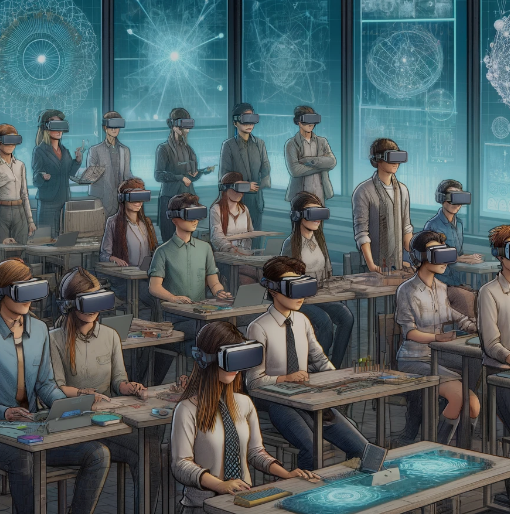Exploring Project-Based Learning in the SVVR Environment: An Epistemic Network Analysis of Pre-service EFL Teachers
DOI:
https://doi.org/10.24903/sj.v9i1.1608Keywords:
SVVR, project-based learning, pre-service EFL teacher, elementary education, epistemic network analysisAbstract
Background:
The goal is to explore how pre-service EFL teachers develop spherical video virtual reality (SVVR) projects, applying technological (TK), pedagogical (PK), and content knowledge (CK).
Methodology:
The data was collected from artifacts of pre-service EFL teachers' SVVR, and then analyzed using epistemic network analysis, a quantitative ethnography analysis.
Findings:
The pre-service EFL teachers primarily utilized TK features when designing virtual reality projects. These projects incorporated text-to-speech (TTS) to offer authentic speakers.
Conclusion:
This study showcased the extent to which pre-service EFL teachers developed their virtual reality projects and the features they used.
Originality:
Our study, utilizing epistemic network analysis, adds a layer to the common analysis, enriching the understanding of pre-service teachers' SVVR projects.
References
Bell, A., & Mladenovic, R. (2015). Situated learning, reflective practice and conceptual expansion: effective peer observation for tutor development. Teaching in Higher Education, 20(1), 24-36. https://doi.org/10.1080/13562517.2014.945163
Chen, C. H., Hung, H. T., & Yeh, H. C. (2021). Virtual reality in problem‐based learning contexts: Effects on the problem‐solving performance, vocabulary acquisition and motivation of English language learners. Journal of Computer Assisted Learning, 37(3), 851-860. https://doi.org/10.1111/jcal.12528
Chen, M. R. A., & Hwang, G. J. (2022). Effects of experiencing authentic contexts on English speaking performances, anxiety and motivation of EFL students with different cognitive styles. Interactive Learning Environments, 30(9), 1619-1639. https://doi.org/10.1080/10494820.2020.1734626
Chien, S. Y., Hwang, G. J., & Jong, M. S. Y. (2020). Effects of peer assessment within the context of spherical video-based virtual reality on EFL students’ English-Speaking performance and learning perceptions. Computers & Education, 146, 103751. https://doi.org/10.1016/j.compedu.2019.103751
Ebadi, S., & Ebadijalal, M. (2022). The effect of Google Expeditions virtual reality on EFL learners’ willingness to communicate and oral proficiency. Computer Assisted Language Learning, 35(8), 1975-2000. https://doi.org/10.1080/09588221.2020.1854311
Gašević, D., Joksimović, S., Eagan, B. R., & Shaffer, D. W. (2019). SENS: Network analytics to combine social and cognitive perspectives of collaborative learning. Computers in Human Behavior, 92, 562-577. https://doi.org/10.1016/j.chb.2018.07.003
Hwang, G. J., Chang, C. C., & Chien, S. Y. (2022). A motivational model‐based virtual reality approach to prompting learners' sense of presence, learning achievements, and higher‐order thinking in professional safety training. British Journal of Educational Technology, 53(5), 1343-1360. https://doi.org/10.1111/bjet.13196
Hwang, G. J., Chen, Y. T., & Chien, S. Y. (2024). A concept map-based community of inquiry framework for virtual learning contexts to enhance students’ earth science learning achievement and reflection tendency. Education and Information Technologies, 1-26. https://doi.org/10.1007/s10639-024-12454-z
Jong, M. S. Y., Tsai, C. C., Xie, H., & Kwan‐Kit Wong, F. (2020). Integrating interactive learner‐immersed video‐based virtual reality into learning and teaching of physical geography. British Journal of Educational Technology, 51(6), 2064-2079. https://doi.org/10.1111/bjet.12947
Koehler, M., & Mishra, P. (2009). What is technological pedagogical content knowledge (TPACK)?. Contemporary issues in technology and teacher education, 9(1), 60-70.
Kozlova, I., & Priven, D. (2015) ESL Teacher Training in 3D Virtual Worlds. Language Learning & Technology, 19(1), 83-101. Retrieved from http://llt.msu.edu/issues/february2015/kozlovapriven.pdf
Krajcik, J. S., & Blumenfeld, P. (2006). Project-based learning. In R. K. Sawyer (Ed.), The Cambridge Handbook of the Learning Sciences (pp. 317–334). New York, NY: Cambridge University Press
Lin, R. P., & Wu, W. C. V. (2023). Exploring Multiliteracy of Pre-Service Language Teachers through Spherical Video-Based Virtual Reality. Educational Technology & Society, 26(3), 101-114. https://www.jstor.org/stable/48734324
Liu, M. H., & Kleinsasser, R. (2015). Exploring EFL teachers’ CALL knowledge and competencies: In-service program perspectives. Language Learning & Technology, 19(1), 119–138.
McFaul, H., & FitzGerald, E. (2020). A realist evaluation of student use of a virtual reality smartphone application in undergraduate legal education. British Journal of Educational Technology, 51(2), 572-589. https://doi.org/10.1111/bjet.12850
Shaffer, D. W. (2017). Quantitative ethnography. Cathcart Press, WI
Shaffer, D., & Ruis, A. (2017). Epistemic network analysis: A worked example of theory-basedlearning analytics. Handbook of learning analytics.
Sun, M., Wang, M., Wegerif, R., & Peng, J. (2022). How do students generate ideas together in scientific creativity tasks through computer-based mind mapping?. Computers & Education, 176, 104359. https://doi.org/10.1016/j.compedu.2021.104359
Tseng, S. S., & Yeh, H. C. (2019). Fostering EFL teachers’ CALL competencies through project-based learning. Journal of Educational Technology & Society, 22(1), 94-105. https://www.jstor.org/stable/26558831
Wenger, E., McDermott, R., & Snyder, W. M. (2002). Seven principles for cultivating communities of practice. Cultivating Communities of Practice: a guide to managing knowledge, 4, 1-19.
Vygotsky, L. (1978). Interaction between learning and development. Readings on the Development of Children, 23(3), 34–41.

Downloads
Published
Issue
Section
License
Copyright (c) 2024 Darmawansah Darmawansah, Dani Puspitasari

This work is licensed under a Creative Commons Attribution-ShareAlike 4.0 International License.
Authors retain copyright and grant the journal right of first publication with the work simultaneously licensed under a Creative Commons Attribution 4.0 International License that allows others to share the work with an acknowledgement of the work's authorship and initial publication in this journal.




